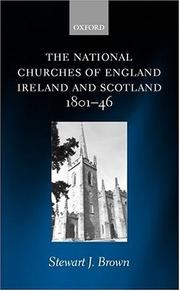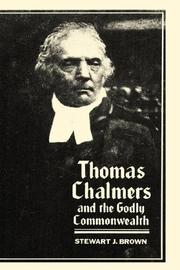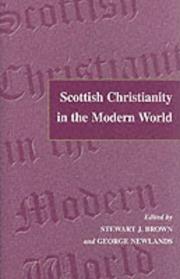| Listing 1 - 10 of 15 | << page >> |
Sort by
|

ISBN: 0199242356 9780199242351 Year: 2001 Publisher: Oxford: Oxford university press,
Abstract | Keywords | Export | Availability | Bookmark
 Loading...
Loading...Choose an application
- Reference Manager
- EndNote
- RefWorks (Direct export to RefWorks)

ISBN: 9780192131140 0192131141 Year: 1982 Publisher: Oxford: Oxford university press,
Abstract | Keywords | Export | Availability | Bookmark
 Loading...
Loading...Choose an application
- Reference Manager
- EndNote
- RefWorks (Direct export to RefWorks)
Clergy --- Social reformers --- Chalmers, Thomas, - 1780-1847
Article
Abstract | Keywords | Export | Availability | Bookmark
 Loading...
Loading...Choose an application
- Reference Manager
- EndNote
- RefWorks (Direct export to RefWorks)
ANTICONVULSANTS --- GRANDE-BRETAGNE --- HOPITAUX --- PHARMACOKINETICS --- HISTOIRE RELIGIEUSE --- SOINS DE JOUR --- CONGRESSES --- 19E SIECLE
Book
ISBN: 1139054120 Year: 2006 Publisher: Cambridge : Cambridge University Press,
Abstract | Keywords | Export | Availability | Bookmark
 Loading...
Loading...Choose an application
- Reference Manager
- EndNote
- RefWorks (Direct export to RefWorks)
During the tumultuous period of world history from 1660 to 1815, three complex movements combined to bring a fundamental cultural reorientation to Europe and North America, and ultimately to the wider world. The Enlightenment transformed views of nature and of the human capacity to master nature. The religious reawakenings brought a revival of heartfelt, experiential Christianity. Finally revolution, the political and social upheavals of the late eighteenth and early nineteenth centuries, challenged established ideas of divine-right monarchies and divinely ordained social hierarchies, and promoted more democratic government, notions of human rights and religious toleration. A new religious climate emerged, in which people were more likely to look to their own feelings and experiences for the basis of their faith. During this same period, Christianity spread widely around the world as a result of colonialism and missions, and responded in diverse ways to its encounters with other cultures and religious traditions.
Church history --- Christianity and culture --- Enlightenment. --- History.
Book
ISSN: 04242084 ISBN: 9781108473798 1108473792 Year: 2018 Volume: 54 Publisher: Cambridge: CUP for the Ecclesiastical History Society,
Abstract | Keywords | Export | Availability | Bookmark
 Loading...
Loading...Choose an application
- Reference Manager
- EndNote
- RefWorks (Direct export to RefWorks)
"The Church and Empire", the theme of Studies in Church History, 54, reflects the reality that from its beginnings, the Christian Church has had close, often symbiotic, relationships with empires and imperial power. Initially the Church engaged with the Roman Empire, subsequently in Europe with the Carolingian, Anglo-Norman, Genoese, Venetian and Holy Roman Empires, and later - through the Church's global expansion with European empires in the Americas, Africa and Asia - the Spanish, Dutch, French and British empires, and the imperial structures it encountered there. Bringing together the work of twenty-four historians, this volume explores the relations of churches and empires, and Christian conceptions of empire, in the ancient, medieval, early modern and modern periods, as well as the role of empire in the global expansion of Christianity.
Christianity and culture --- Church and state --- Church history --- History --- Politics and culture --- Religion and politics --- Religion and civilization. --- Religious aspects. --- Philosophy. --- Politics and culture - Religious aspects. --- Religion and politics - Philosophy.
Digital
ISBN: 9781139061087 Year: 2012 Publisher: Cambridge Cambridge University Press
Abstract | Keywords | Export | Availability | Bookmark
 Loading...
Loading...Choose an application
- Reference Manager
- EndNote
- RefWorks (Direct export to RefWorks)
Book
ISBN: 9781107016446 9781139516815 1139516817 9781139518673 1139518674 1139515160 9781139515160 9781139061087 1139061089 1107016444 9781107680272 1107230446 1139508121 1280774045 9786613684813 1139517740 1139514245 1107680271 9781107230446 9781139508124 9781280774041 6613684813 9781139517744 9781139514248 Year: 2012 Publisher: Cambridge [etc.] Cambridge University Press
Abstract | Keywords | Export | Availability | Bookmark
 Loading...
Loading...Choose an application
- Reference Manager
- EndNote
- RefWorks (Direct export to RefWorks)
The Oxford Movement transformed the nineteenth-century Church of England with a renewed conception of itself as a spiritual body. Initiated in the early 1830s by members of the University of Oxford, it was a response to threats to the established Church posed by British Dissenters, Irish Catholics, Whig and Radical politicians, and the predominant evangelical ethos - what Newman called 'the religion of the day'. The Tractarians believed they were not simply addressing difficulties within their national Church, but recovering universal principles of the Christian faith. To what extent were their beliefs and ideals communicated globally? Was missionary activity the product of the movement's distinctive principles? Did their understanding of the Church promote, or inhibit, closer relations among the churches of the global Anglican Communion? This volume addresses these questions and more with a series of case studies involving Europe and the English-speaking world during the first century of the Movement.
Oxford movement --- 19de eeuw (x) --- C1 --- christendom --- Verenigd Koninkrijk van Groot-Brittannië en Noord-Ierland [land in werelddeel Europa] (x) --- Tractarianism --- High Church movement --- Anglo-Catholicism --- Kerken en religie --- Church of England --- Anglican Church --- Anglikanskai︠a︡ t︠s︡erkovʹ --- Ecclesia Anglicana --- Kirche von England --- United Church of England and Ireland --- History --- Oxford movement. --- Arts and Humanities --- Religion

ISBN: 0567087654 9780567087652 Year: 2000 Publisher: Edinburgh: T&T Clark International,
Abstract | Keywords | Export | Availability | Bookmark
 Loading...
Loading...Choose an application
- Reference Manager
- EndNote
- RefWorks (Direct export to RefWorks)
Christianity --- Scotland
Book
ISBN: 9780199580187 0199580189 Year: 2017 Publisher: New York Oxford University Press
Abstract | Keywords | Export | Availability | Bookmark
 Loading...
Loading...Choose an application
- Reference Manager
- EndNote
- RefWorks (Direct export to RefWorks)
This book which is devided into seven parts reflects the rich and diverse nature of scholarship on the Oxford Movement and provides pointers to further study and new lines of enquiry. The parts consider the origins and historical context of the Oxford Movement, the beginnings and early years of the Oxford Movement, the distinctive theological developments of this movement as well as the years of crisis between 1841 and 1845. The broader cultural expressions and influences of the Oxford Movement are considered and also the impact of the Oxford Movement on Churches beyond the English heartland, as well as remaining a vital force in the twentieth century. The book draws to a close with more generalised reflections on the impact of the Oxford Movement.
Digital

Year: 2018 Publisher: Cambridge New York Melbourne Oxford Cambridge University Press Ecclesiastical History Society
Abstract | Keywords | Export | Availability | Bookmark
 Loading...
Loading...Choose an application
- Reference Manager
- EndNote
- RefWorks (Direct export to RefWorks)
| Listing 1 - 10 of 15 | << page >> |
Sort by
|

 Search
Search Feedback
Feedback About UniCat
About UniCat  Help
Help News
News